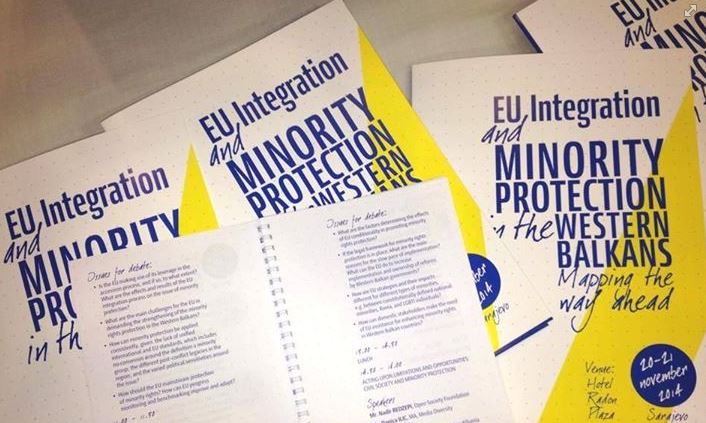Dates: 20 – 21 November 2014
Region: Western Balkans
 The latest Gay Pride Parade held in Belgrade under heavy security and police presence is just one of the examples of minorities’ status in Western Balkans. Many would argue though, that the situation can be improved in the whole Europe. For instance, some of the problems are xenophobia and hate speech towards the immigrants in the old EU member countries, as well as the culture of segregation and discrimination against Roma in Hungary and Slovakia.
The latest Gay Pride Parade held in Belgrade under heavy security and police presence is just one of the examples of minorities’ status in Western Balkans. Many would argue though, that the situation can be improved in the whole Europe. For instance, some of the problems are xenophobia and hate speech towards the immigrants in the old EU member countries, as well as the culture of segregation and discrimination against Roma in Hungary and Slovakia.

At the conference “EU Integration and Minority Protection in the Western Balkans: mapping the way ahead” held in Sarajevo within the MAXCAP project, the effectiveness of EU instruments and strategies for strengthening minority rights protection was discussed.
The two-day discussion between EU officials, domestic politicians, civil society representatives, and academics could be summarised in the words of one of the speakers: “EU needs to stop being lethargic. It needs to step up when it comes to minority protection.”
A set of statements by the citizens in Western Balkans expressing their views on enlargement, as a part of the Leiden University research, was presented in Sarajevo. “The views we got from the citizens in Macedonia could be formulated as blocked enthusiasm, facade readiness and European future, while in Serbia where some of the strongest opposition to joining the EU was expressed, we got enthusiastic opportunism, European antagonism or conditioned realism”, said Elitsa Kortenska, Ph.D. Researcher.
Marko Kmezić, a lecturer and senior researcher at the Centre for Southeast European Studies at the University of Graz, warned that ‘EU still does not have an anti-discrimination directive’. “Candidate countries in the Western Balkans and potential candidates need clarity from EU on what they need to do with regards to minority rights,” said Kmezić.
Talking about minority rights and the way media cover that topic, the Media Diversity Institute Communications Manager Dasha Ilić presented several examples of discriminatory approach to marginalised groups and ethnic minorities, as well as immigration issues in the UK press.
Key goals of the conference were to assess the effectiveness of EU instruments and assistance directed at minority rights protection ‘on the ground’, as well as to examine the limits of EU conditionality in the Western Balkans.
At the MAXCAP conference held on 20-21 November in Sarajevo the future of minority protection in the region in light of recent political developments (e.g. Bosnian protests; anti-Cyrillic protests in Vukovar by veterans; inter-ethnic violence in Macedonia) were also discussed.
